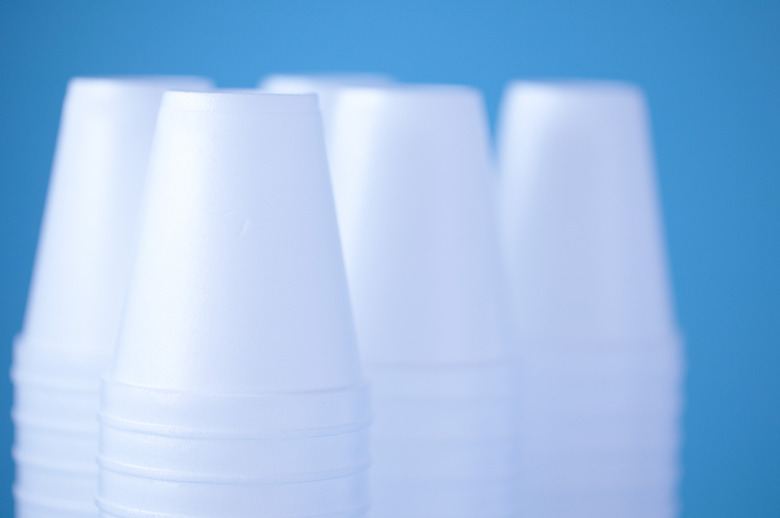What Happens To Styrofoam In A Microwave?
"Styrofoam" is the brand name of a specific type of expanded polystyrene foam produced by Dow Chemical Company and is usually used in boat construction and building insulation. There are many other brands of disposable expanded polystyrene foam food and beverage containers, and their response to microwaving depends primarily on the temperature of the food or drink within them.
Making the Foam
Making the Foam
Polystyrene is a polymer made of identical, repeating chains of styrene molecules. Styrene is a plastic formed by combining the hydrocarbons benzene and ethylene. Polystyrene foam products are made by puffing polystyrene with pentane or carbon dioxide gas and then molding it. Polystyrene foam can be melted into hard polystyrene nuggets, but cannot be "refoamed" without the gas-puffing process.
In the Microwave
In the Microwave
The U.S. Food and Drug Administration regulates disposable and microwaveable food containers based on their likely length of contact with food, temperature and possible chemical leaching. Microwaves heat the water within food, which transfers heat to the solids and container. If this water boils — 212 degrees Fahrenheit — it can melt polystyrene foam and release styrene gas. Styrene gas from food containers has been implicated in the proliferation of human breast tumor cells, according to a 2001 study conducted by Tokyo Metropolitan Research Laboratory of Public Health and published in Environmental Health Perspectives. However, no endocrine-disrupting or carcinogenic activity in a 2002 study by Date, et al., published in the same journal. Foam containers labeled "microwaveable" are considered safe provided they're heated to less than 212 degrees Fahrenheit.
References
- Encyclopedia Britannica: Polystyrene (Chemical Compound)
- UL Prospector: Polystyrene (PS) Plastic
- Harvard Medical School HEALTHbeat: Microwaving Food in Plastic – Dangerous or Not?
- DartContainer.com: Microwaving and Polystyrene Foam
- The Free Library: Estrogenicity of Styrene Oligomers and Assessment of Estrogen Receptor Binding Assays (Correspondence)
- Environmental Health Perspectives: Certain Styrene Oligomers Have Proliferative Activity on MCF-7 Human Breast Tumor Cells and Binding Affinity for Human Estrogen Receptor
Cite This Article
MLA
Libal, Angela. "What Happens To Styrofoam In A Microwave?" sciencing.com, https://www.sciencing.com/happens-styrofoam-microwave-4925545/. 24 April 2017.
APA
Libal, Angela. (2017, April 24). What Happens To Styrofoam In A Microwave?. sciencing.com. Retrieved from https://www.sciencing.com/happens-styrofoam-microwave-4925545/
Chicago
Libal, Angela. What Happens To Styrofoam In A Microwave? last modified March 24, 2022. https://www.sciencing.com/happens-styrofoam-microwave-4925545/
